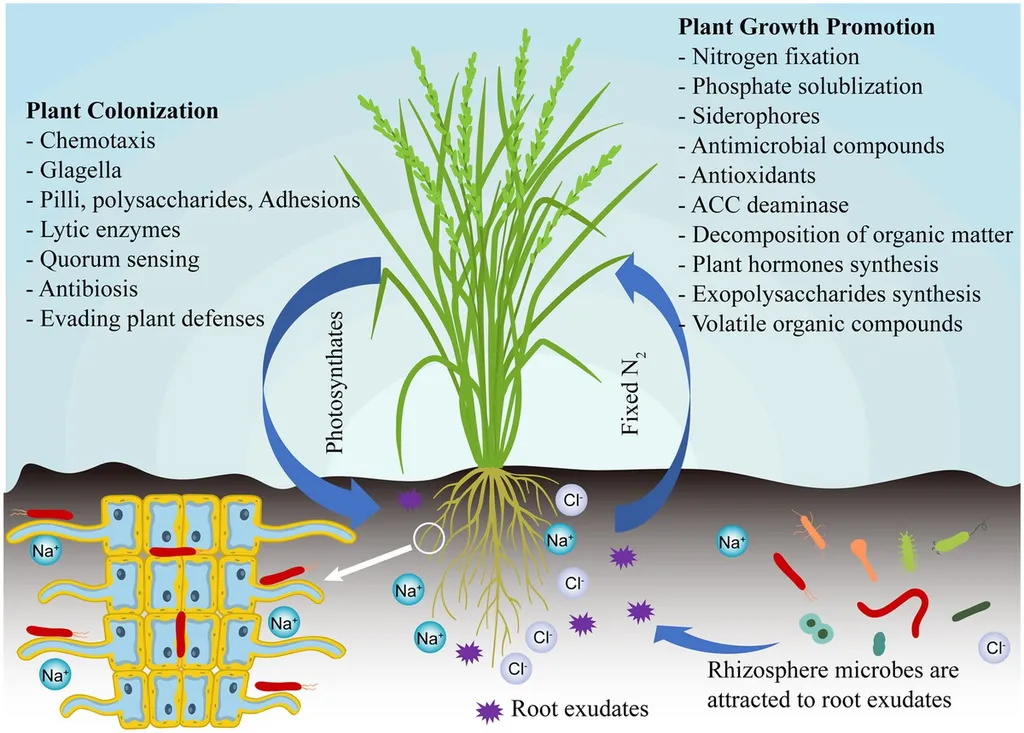In the face of escalating global food insecurity and the relentless march of climate change, scientists are turning to nature’s hidden allies to bolster agricultural resilience. A recent study published in *Scientific Reports* has shed light on the remarkable potential of bacterial endophytes—microorganisms that live within plant tissues—to mitigate salt stress in crops, offering a promising avenue for sustainable agriculture.
The research, led by Karim Gul of the Department of Biotechnology at Abdul Wali Khan University, focused on three bacterial endophytes isolated from *Moringa oleifera*: *Serratia marcescens* (KR-27), *Klebsiella aerogenes* (KL-4), and *Lelliottia amnigena* (KS-7). These microbes were tested for their ability to promote plant growth under salinity stress, a condition that threatens agricultural productivity worldwide.
The findings were compelling. The endophytes demonstrated significant plant growth-promoting effects, enhancing the morphological parameters and biomass of rice plants. “The endophytes slightly enhanced the growth indices and fresh/dry biomass of the rice plantlets,” Gul noted, highlighting the potential of these microbes to improve crop yields in saline environments.
But the benefits didn’t stop at growth promotion. The study also revealed that the endophytes substantially increased the levels of phytohormones like indole acetic acid (IAA), gibberellic acid (GA3), and salicylic acid (SA), while reducing abscisic acid (ABA). This hormonal balance is crucial for plant stress responses and overall health. Additionally, the photosynthetic pigments chlorophyll a, b, and carotenoids were elevated, further underscoring the growth-promoting effects of the endophytes.
Perhaps most intriguingly, the research showed that the endophytes could regulate imbalanced ionic concentrations and induce the enzymatic antioxidant system of rice plants in the presence of 200 mM NaCl. Strains KS-7 and KR-27 effectively amplified the enzymatic activities of catalase (CAT), ascorbate peroxidase (APX), and glutathione, providing a robust defense against salt stress.
The commercial implications of this research are substantial. As global population growth and climate change exacerbate food insecurity, the agriculture sector is under increasing pressure to develop sustainable and resilient crop production methods. The use of bacterial endophytes could offer a cost-effective and environmentally friendly solution to mitigate salt stress, thereby enhancing crop yields and food security.
“This study opens up new possibilities for leveraging microbial symbionts to improve agricultural resilience,” Gul said. “The applications of these newly identified strains of *M. oleifera* in mitigating salinity stress could be a game-changer for sustainable agricultural practices.”
As we look to the future, the integration of microbial technologies into mainstream agriculture could revolutionize the way we grow crops, making them more resilient to environmental stresses and ensuring food security for generations to come. The research published in *Scientific Reports* by Karim Gul and his team is a significant step in this direction, offering hope and practical solutions for a more sustainable and secure agricultural future.

